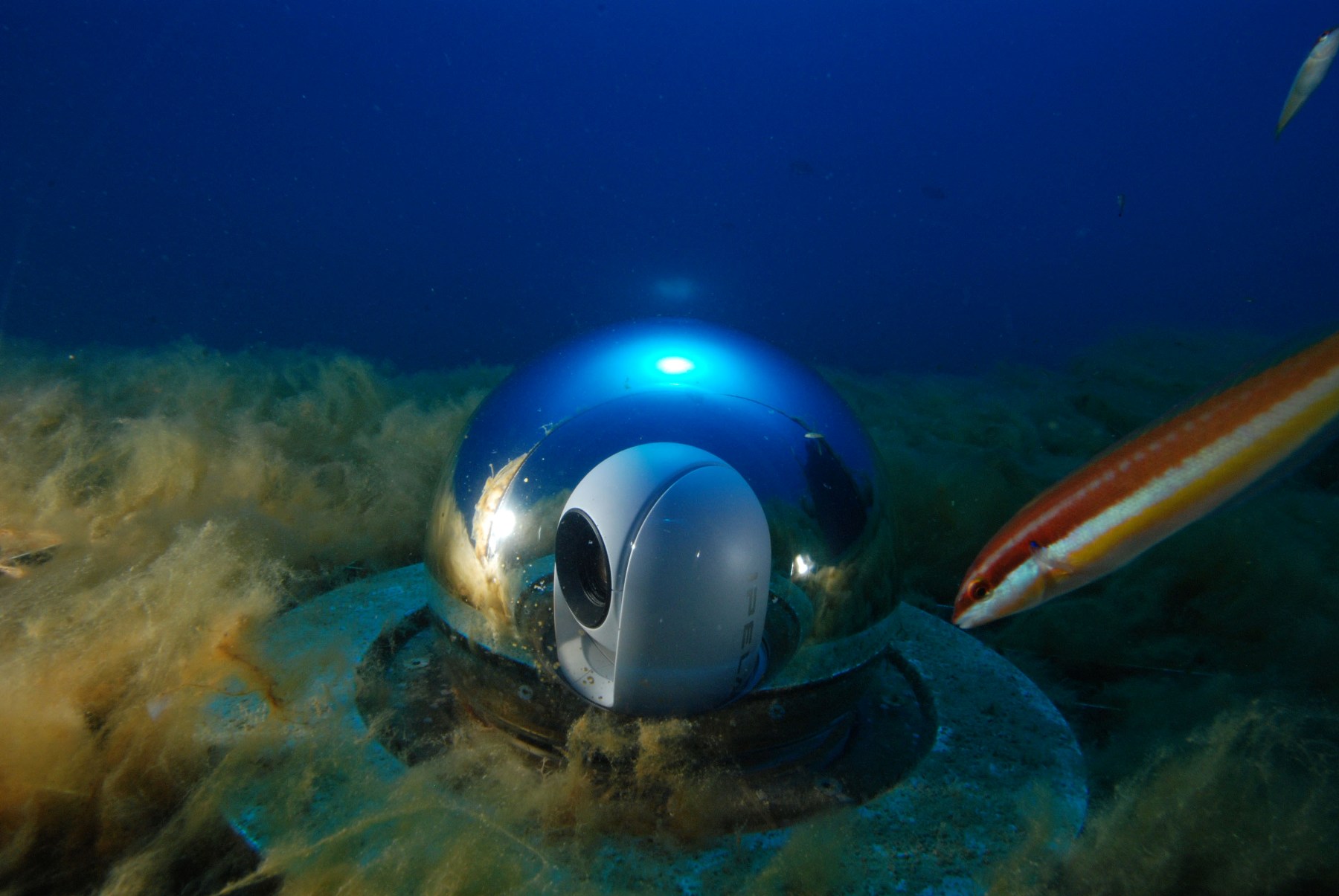Expandable Seafloor Observatory
OBSEA is a cabled seafloor observatory located 4 km off the Vilanova i la Geltru coast in a fishing protected area. It is connected to the coast by an energy and communications mixed cable (OceanOPS WMO number: 6103565).
- Provides an uninterrupted power supply to the scientific instruments.
- Offers a high bandwidth communication link.
- Real time data is available and problems encountered in battery powered systems are avoided.
- An optical Ethernet network that transmits data continuously to marine sensors connected to the observator.
LATEST NEWS

SARTI-UPC at the TerraTwin Kick-Off Meeting
Published on 2026-03-03
The TerraTwin project officially started with its Kick-Off Meeting held in Athens, Greece. Representatives from 14 partner organisations across 10 European countries met for two days of strategic plannin

Official kick-off of the SMART-ME and AI4SEA projects at UPC
Published on 2026-01-28
On January 21st, the Facultat de Nàutica de Barcelona (UPC) hosted the kick-off meetings of two strategic marine research projects: SMART-ME and AI4SEA, both with a strong involvement of the SARTI-UPC research group.

OBSEA, IFCA and EGI: an open e-infrastructure for marine Science - supporting marine science together
Published on 2026-01-21
OBSEA’s daily operations and long-term scientific activities are made possible through an exceptional collaboration between OBSEA, IFCA and EGI. The long-standing collaboration developed through multiple initiatives

SARTI–UPC completes an oceanographic campaign with benthic landers
Published on 2025-12-12
SARTI–UPC has successfully completed its latest oceanographic campaign aboard the R/V Sarmiento de Gamboa, marking the final field operation of the year within the framework of the BITER and LIFE ECO-REST projects.

UPM Acoustics Master’s students visit SARTI–MAR OBSEA to learn about acoustic applications in the marine environment
Published on 2026-01-22
A group of students from the Master’s Degree in Acoustics at the Universidad Politécnica de Madrid (UPM) took part in a training visit to the OBSEA underwater observatory operated by the SARTI research group of the UPC.
Latest Readings
OBSEA(ctd)
OBSEA(Buoy)
EUROPEAN PROJECTS
In the OBSEA we are collaborating with interoperability projects to provide the acquired data information using standard protocols.

TerraTwin – Digital Twin per al Clima i la Biodiversitat
TerraTwin té com a objectiu desenvolupar un Digital Twin d’Ecosistemes (DTE) holístic per millorar la comprensió i la predicció de les interaccions complexes entre e...
ONGOING

MERLIN - Demostració de vehicles autònoms intel·ligents multipropòsit de llarga durada per a aplicacions marines
El projecte MERLIN se centra en el desenvolupament i demostració de vehicles de superfí...
ONGOING

Deep Discovery
El projecte Deep Discovery és una innovadora iniciativa educativa dissenyada per inspirar la pròxima generació a través de la ciència marina participativa, promovent ...
ONGOING
NATIONAL PROJECTS
ONGOING

AI4SEA
AI4SEA
AI4SEA és un projecte de recerca multidisciplinari centrat en el desenvolupament de sistemes intel·ligents amb intel·...
ONGOING
SMART-ME
SMART-ME
SMART-ME és un projecte coordinat de recerca que busca establir una nova estació d’observació marina en aigües pro...
CLOSED

GIRASOL II
GIRASOL II
El projecte, GIRASOL II, pretén investigar, desenvolupar i validar els nous conceptes i els millorats del bessó digita...
CLOSED
SLAGREEF
SLAGREEF
L'objectiu principal del projecte serà la fabricació d'esculls artificials per a biòtops marins utilitzant una impres...
Contact Us
Technological Development Center of Remote Acquisition and Data Processing Systems
ADDRESS
Centre Tecnològic de Vilanova i la Geltrú
Rambla Exposició 24 Edifici C
08800 Vilanova i la Geltrú (Barcelona)



